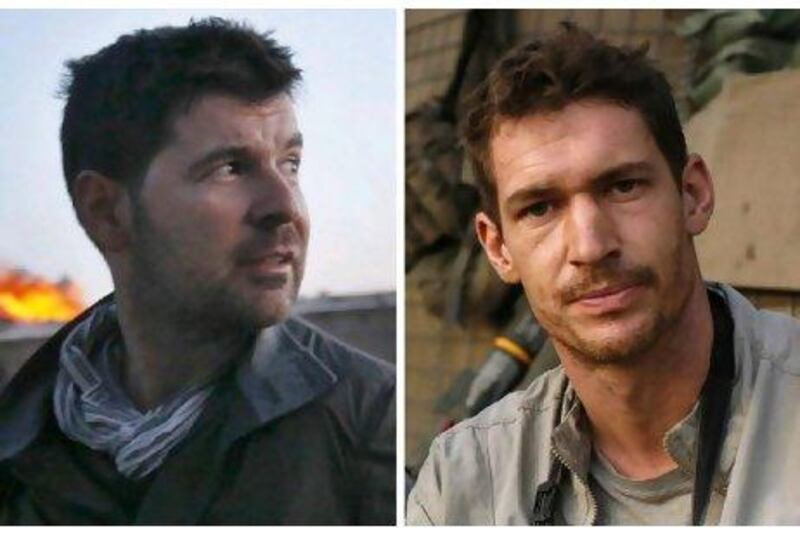Hetherington and Hondros were hurt while covering battle
Leila Fadel and Jason Horowitz
MISURATA // On Saturday, Tim Hetherington, the director of the Oscar-nominated documentary Restrepo, and Chris Hondros, a Pulitzer Prize-nominated photographer, hitched a ride to this besieged city on the Ionian Spirit, where they prepared sandwiches for refugees and talked about their plans back home. On Wednesday, the ship ferried the bodies of the two renowned journalists back to Benghazi.
The two journalists were fatally wounded during an attack by Col Muammar Qaddafi's forces against rebels in Misurata. Two other photojournalists suffered injuries, some critical, according to doctors at the hospital where they were treated.
Hetherington, 40, a photographer and filmmaker who famously recounted the plight of US soldiers in Afghanistan, died shortly after the attack, according to his family.
Hondros, 41, a photographer for Getty Images, died several hours later, according to Emma Daly, a spokeswoman for the New York-based group Human Rights Watch. Hondros's depictions of war's toll have appeared in many magazines and newspapers.
The journalists had accompanied rebel fighters to Tripoli Street in the city centre, which Col Qaddafi's forces pounded with mortar fire in an attempt to retake the strategic road that divides Misurata. An ambulance took Hetherington and Guy Martin, 28, a British freelance photographer working for the news agency Panos, from the battle to the makeshift triage tent next to the Hikma hospital at about 5pm. Hetherington was bleeding heavily from his leg and looked very pale.
"Come with me. Come with me. Everybody is injured," an American photographer who had seen the attack shouted to ambulance drivers, imploring them to return to the scene. Her bulletproof vest was splattered with blood. "I'll come with you. I'll show you where they are."
As she sought help, doctors attended to Hetherington and Martin, who had suffered a stomach wound and remained in surgery on Wednesday evening. About 15 minutes after the ambulance's arrival, doctors in the tent pronounced Hetherington dead.
About 10 minutes later, another ambulance carried Hondros and Michael Christopher Brown, who also suffered shrapnel wounds, to the triage unit. Doctors examining a scan of Hondros's brain explained that shrapnel had hit the photographer in the forehead and passed through the back of his head. They asked a reporter at the hospital to look after his battered helmet. Brown's medical condition was considered less dire.
The group of American and British photojournalists were following rebels into heavy fighting. "I told them not to gather," one rebel outside the tent recalled advising the photographers about the dangers of sticking too close together. "They hit groups. I told them not to."
Hetherington's family released a statement mourning the loss: "It is with great sadness we learned that our son and brother photographer and filmmaker Tim Hetherington was killed today in Misurata, Libya, by a rocket-propelled grenade." They added: "Tim was in Libya to continue his ongoing multimedia project to highlight humanitarian issues during time of war and conflict. He will be forever missed."
Cathy Saypol, Hetherington's manager, said in an interview that she learnt of his death as she spoke on the phone with the author Sebastian Junger, with whom Hetherington had directed the Oscar-nominated documentary.
"There is no way to express my devastation and sorrow at the death of my dear friend," Junger said in a statement. He added, "I can't believe he's truly gone."
Hetherington and Junger were recently in Libya together, working on an assignment for Vanity Fair, according Beth Kseniak, a spokeswoman for the magazine. Hetherington was not on assignment for the magazine at the time of his death, she said. Hetherington and Hondros are the third and fourth journalists, and the first western journalists, killed in Libya since fighting began in February, according to the New York-based Committee to Protect Journalists. Hetherington, the recipient of the 2007 World Press Photo Award for his photos of US soldiers in Afghanistan for Vanity Fair, reported on the heavy bombardment earlier in the week via his Twitter account. "In besieged Libyan city of Misurata," he wrote. "Indiscriminate shelling by Gadhafi forces. No sign of Nato."
"It is over all quite bad," Gypsy Guillen Kaiser, a spokeswoman for the committee, said of the situation in Libya. "As we speak, there are journalists - at least 18 - missing and detained, and we don't know their fate."
Last week, Hondros and Hetherington joined other colleagues on the Ionian Spirit, dispatched to evacuate foreign workers from the embattled city. During the 20-hour voyage, Hetherington ate chips while Hondros told the colleagues about his recent engagement to a woman from New York. "I don't want to be a really old dad," he confided.
On Wednesday evening, that same vessel waited at port in Misurata for another cargo of migrant workers but was enlisted for a different mission. Before Hondros died at 10.45pm, Human Rights Watch reached out to the ship's handlers and asked whether it could be used to transport him and Martin back to Benghazi for additional medical care. Instead, the bodies of Hetherington and Hondros were due to leave aboard the Ionian Spirit on Wednesday evening.
* The Washington Post






